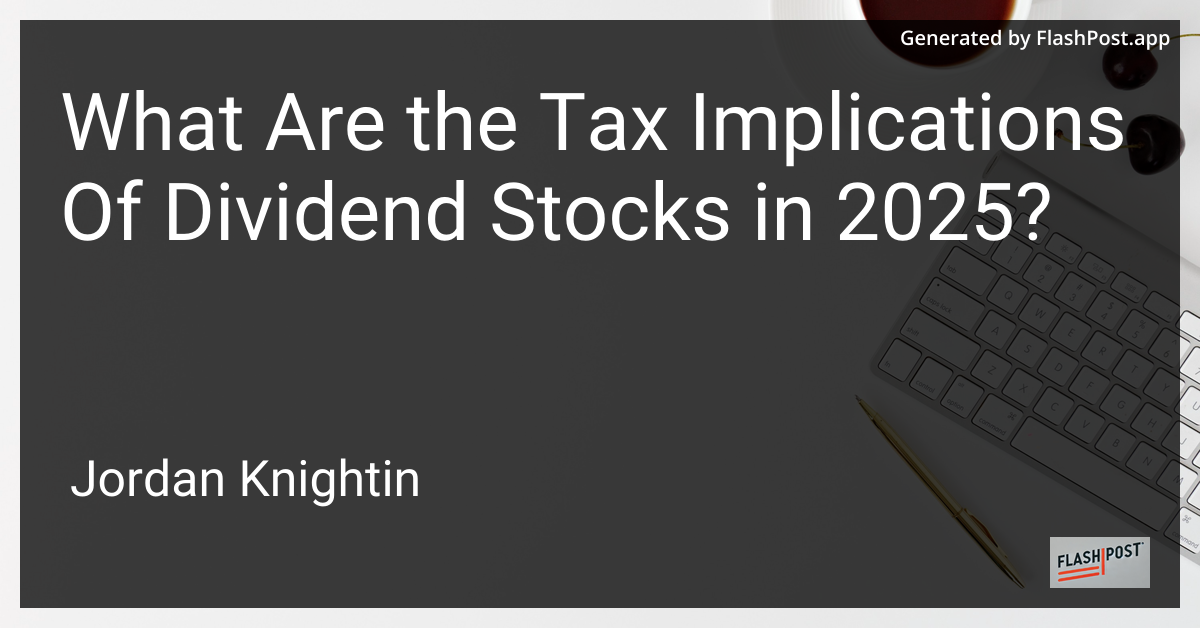

What Are the Tax Implications Of Dividend Stocks in 2025?
Investing in dividend stocks is a popular strategy among investors seeking regular income alongside potential capital gains. However, understanding the tax implications of dividend stocks is crucial to maximize your investment returns. In this article, we’ll explore the key tax considerations for dividend stocks in 2025, helping you make informed investment decisions.
What are Dividend Stocks?
Dividend stocks are shares of companies that regularly distribute a portion of their earnings to shareholders in the form of dividends. These stocks can be an attractive option for those looking for steady income streams in addition to capital appreciation.
For more information on how to identify and choose the right dividend stocks, check out this guide on screening for dividend stocks.
Tax Implications of Dividend Stocks in 2025
1. Qualified vs. Ordinary Dividends
Dividends can be categorized into two types: qualified and ordinary dividends. Qualified dividends are taxed at a lower rate, which is the same as long-term capital gains tax rates. In contrast, ordinary dividends are taxed at standard income tax rates.
To benefit from the lower tax rate, you must hold the dividend-paying stock for more than 60 days within the 121-day period that begins 60 days before the ex-dividend date. Understanding these nuances can impact your investment strategy significantly.
2. Tax Rates for Qualified Dividends
The tax rates for qualified dividends are anticipated to remain consistent with capital gains tax rates in 2025:
- 0% for individuals in the 10%-12% tax brackets.
- 15% for individuals in the 22%-35% tax brackets.
- 20% for those in the 37% tax bracket.
These rates underscore the importance of holding stocks long enough to qualify for the preferential tax treatment.
3. Non-Qualified or Ordinary Dividend Taxation
Ordinary dividends are taxed at your marginal income tax rate. In 2025, these rates are expected to mirror the current federal income tax brackets, potentially ranging from 10% to 37%, depending on your taxable income.
4. Net Investment Income Tax (NIIT)
High-income earners are subject to the Net Investment Income Tax (NIIT), which is an additional 3.8% tax on investment income, including dividends, if your modified adjusted gross income exceeds certain thresholds ($200,000 for single filers and $250,000 for married filing jointly, as of 2025).
5. State Taxes
Don’t forget state and local taxes! Depending on where you reside, dividend income might also be subject to additional state taxes, which can vary significantly.
6. Tax-Advantaged Accounts
Investing in dividend stocks through tax-advantaged accounts like Roth IRAs or traditional IRAs can help defer or even eliminate taxes on dividend income, depending on the type of account. This strategy can be highly beneficial, especially for long-term investors.
Maximizing After-Tax Gains with Dividend Stocks
Having a tax-efficient strategy is crucial in maximizing returns from dividend stocks. Here are a few tips to consider:
- Hold dividend stocks long-term to qualify for the favorable tax rates on qualified dividends.
- Utilize tax-advantaged accounts for dividend investing.
- Regularly review your portfolio and tax situation to align with any changes in tax laws or personal circumstances.
For more insights on making informed decisions, visit the article on evaluating dividend stocks.
Conclusion
Understanding the tax implications of dividend stocks in 2025 requires proactive planning, especially with potential changes in tax legislation over time. By strategizing around qualified dividends, considering tax-advantaged accounts, and staying informed on current tax rates, you can effectively optimize your investment portfolio.
For those eager to deepen their knowledge, additional guidance can be found in our complementary article on dividend stocks screening.
This article aims to provide foundational knowledge on dividend stock taxation and how to navigate these implications strategically to enhance after-tax returns. Always consult with a tax advisor for personalized advice tailored to your individual financial situation.
